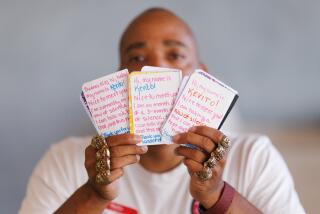Trouble in Making of ‘Paradise’
- Share via
The story behind the story on some movies is often as compelling and dramatic as what’s on screen. That mirror reflection between life and art certainly applies to Larry Clark’s “Another Day in Paradise,” a candid, cautionary tale about drug abuse and petty thievery.
The making of the movie, which opens Wednesday, was as edgy and fraught with potential disaster as the story it tells, according to those involved with the film. “Given the outrageous circumstances, it’s amazing that the movie happened at all,” says the film’s co-producer and co-writer Stephen Chin.
How outrageous? The film’s star and co-producer James Woods described the shoot as a “nightmare” and the director as a “rude pig.” The night of the film’s world premiere in Venice, Clark physically attacked Chin. Soon after Clark checked himself into the Caron Foundation, which he describes as a rehab center for “chronic relapsers.”
“Paradise” is only the second film by Clark, the noted 54-year-old photographer and artist following his controversial first feature, “Kids.” Filming began late last year in Southern California and the film debuted to enthusiastic notices at this year’s Venice and Toronto film festivals. But what happened in between was just wild.
Woods and Clark butted heads several times when the director’s unorthodox style ran afoul of a tight production schedule and limited budget of $4.5 million. Matters worsened during the editing process when the director--by his own admission--fell off the wagon and the film came close to being turned over to its creditors. Clark is now back at work but spending his nights at a halfway house in Manhattan.
Woods is happy with the finished product, especially with the film’s central performances. (Melanie Griffith and Natasha Gregson Wagner also star.) But he does not underplay the problems that nearly cost him and Chin their homes, which were put up as collateral with the completion bond company.
“Another Day” is based on an unpublished prison manuscript by an unknown writer named Eddie Little. Chin, who also co-wrote the script with Christopher Landon, is a longtime friend of Clark’s and despite their own battles during the process, defends the artist-turned-filmmaker.
“Larry brought a great deal of emotional complexity to it, and [the film’s stars] James Woods and Melanie Griffith give their most unself-conscious performances ever,” Chin says.
Caught Off Guard by Financial Realities
Clark found himself at sea in the financial realities of movie-making with its “bond companies, contingencies, production schedules,” Chin explains. “Because he’s been a successful artist, Larry has been able to live his life on unconventional terms. I don’t think he’s ever worked a 9-to-5 job or collaborated with real actors before.
“ ‘Kids’ was made with a great deal of freedom, with young people many of whom Larry had known for several years. He was their hero and guru. They trusted his style of making art, which is very much about chaos.”
In a recent interview, Clark admits “things got pretty crazy. There were a couple of moments when things looked out of control,” he says. “But I always knew what I was doing. Jimmy and I got into a screaming match at one point, but it was calculated by me to get everyone on their toes.”
While admitting that the creative tension on the set may have added to the dramatic tension of the movie, Woods was nonetheless thrown by the chaotic atmosphere. “Filmmaking requires a certain amount of preparation,” he says, “which is why we lost seven pages of dialogue on one day, and in one major scene the light didn’t match. If that’s the way he makes art, fine. But what about other people’s [the actors’] art?”
A major bone of contention for Woods was Clark’s friendship with the film’s other co-star, 19-year-old Vincent Kartheiser, which Woods says reflected the mentor-protege friendship between Woods’ and Kartheiser’s characters in the film, though the young actor’s manager Mike Cutler says there was no such bond.
“I’m not really sure what Jimmy’s talking about,” says Clark, when asked about his relationship with Kartheiser.
No Penalty for Showing Up Late
Woods was particularly upset when his young co-star showed up late on the set and Clark did not take him to task. “When someone shows up three hours late, it’s a humiliation and a violation of professionalism,” he says. “We weren’t able to shoot a very important scene properly because of it.” (The scene is one in which Woods’ character explains some vital plot points.)
Cutler admits his client was late a couple of times, but mainly because he sometimes got lost trying to find the location. (Kartheiser, who has acted in movies since age 5, lives in Minnesota and was unavailable for comment.) While Chin admits Kartheiser was not always on time, he calls the problem “a cultural difference” between the young actor’s approach and that of the more seasoned Woods.
“Vincent’s style is loose and improvisational,” Chin said. “He didn’t wear any makeup in the film so he didn’t feel the need to show up at his call time.”
But that was just Act 1 of the saga. After the tumultuous shoot wrapped in January, Clark moved to the editing room and nearly wound up forfeiting all his hard work. “The stress got to me,” Clark admits. “I’ve taken a lot of drugs in my life. After the shoot I took some. I’m an addict. I have a tendency to do that.”
When Clark’s cut of the film was shown to potential distributors, it was 40 minutes longer, says Woods, and would have brought an NC-17 rating because of a graphic sex scene between Kartheiser and his love interest Wagner. Distributors demurred and the bank began to apply pressure on the producers. Clark made some minor changes but was clearly in no condition to do the work required.
Because the bank loan was predicated on delivering an R-rated film, Woods and Chin came within days of losing possession of the movie and their homes as well. Contractually Clark had final cut, but Chin argued, “If the bank and the bond company take the film away from us, they’ll cut it themselves and that’ll be much worse.”
The producers eventually wrested the film away from Clark and re-cut it in California, though they consulted with the director every step of the way. “Larry may not remember this, but at the time he was ecstatic about the re-cut movie,” Chin says. “He said I was a hero, a genius.”
The re-edited version was accepted by the Venice and Toronto festivals and received strong reviews. Trimark Pictures stepped forward and made an offer for the film. Though Clark had agreed to the changes, he began maligning Woods in interviews, further alienating the actor. “We killed ourselves to allow him to make the film his way and he’s saying I ruined his picture,” Woods says. “He was passed out drunk in the editing room and, as the producer, I could have had him thrown out. But I promised I wouldn’t interfere. He got his final cut. [Clark’s original cut of the film will eventually be released on DVD.] At least thank me instead of acting like a rude pig.”
Then, on the evening of the film’s world premiere in Venice, Clark physically attacked Chin. “The Larry Clark that punched me out in Venice is not the Larry Clark I know as a friend,” Chin says. “I’m not apologizing for him. What he did was despicable, especially since I consider myself his friend and worked incredibly hard under extraordinary circumstances to give him unparalleled freedom.”
Clark explains that the attack came after a day in which he did “about 40 interviews and had about 60 margaritas. I was out of control. I have no defense. My motto is to never plead guilty. But in this case, I plead guilty.”
The binge continued through the Toronto festival, after which Clark checked himself into drug rehab. “I put myself into rehab because I didn’t want to feel like I was feeling anymore. The drugs don’t work so well anymore. There are a lot of things I want to do and I have two children I love and want to watch grow up. So I saved my life, again.”
Chin notes that the plot of “Another Day in Paradise” addresses many of the same issues that came up during the making of the film. “Larry prides himself that he takes no moral position. But it’s impossible not to take a moral message from this movie, which is about a tragic character who thinks he’s helping but ultimately winds up hurting a lot of people around him. Larry, like many artists, achieves a clarity and expressiveness in his work that he rarely has in life.”
For the record, Clark, Chin and Woods say they would probably work together again.
More to Read
Only good movies
Get the Indie Focus newsletter, Mark Olsen's weekly guide to the world of cinema.
You may occasionally receive promotional content from the Los Angeles Times.










